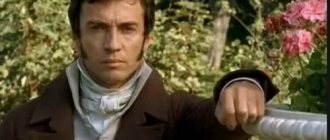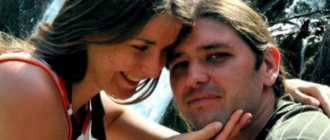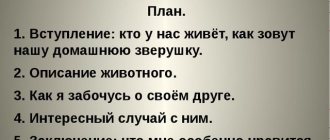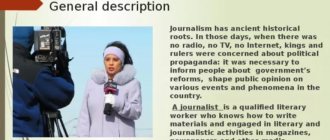Life path in literature
Every day people search for answers to many questions. Schoolchildren decide what to eat for breakfast, what clothes to wear, whether to take the bus or walk to school. At the end of classes, a dilemma arises: do your homework immediately after returning home or after going out with friends. These small daily problems are easily solved. But there are more serious issues in human life.
Where to go after school, what profession to choose, what to do in life—this is what yesterday’s graduates have to think about. And everyone has their own selection criteria. An adult sometimes thinks that if he had made a different decision, everything would have turned out differently, perhaps much happier. Many works of Russian classics reveal the problem of choosing a life path. Arguments from literature teach you to analyze the experience of heroes and draw the right conclusions. With their help you can solve the most complex problems:
- The novel “Oblomov” reveals the theme of choosing one’s place in life. The author I. A. Goncharov shows readers what absolute lack of will or, conversely, strong character and perseverance in achieving a goal can lead to. Ilya Oblomov is the main character of the work. He doesn't like to put in effort, is lazy and stubborn. At the end of the novel, this character becomes a faceless shadow, his existence is aimless and joyless.
- Eugene Onegin from the novel of the same name by A. S. Pushkin is influenced not by his own choice, but by his expected inheritance. But he is not satisfied with a carefree life, in which there is only room for balls, and yes, for love pleasures. He rejects secular life, the moral standards accepted in the society of that time. The fame of an eccentric is assigned to him. And yet Onegin does not stop searching for life values and goals.
- “The Man in the Case” is an example of choosing a closed and secluded life. The main character of A.P. Chekhov cannot enjoy life, since he voluntarily renounces its joys. Belikov is calmer when life does not present surprises, everything that happens is planned. Any deviation from the established rules can seriously affect the psyche of such people. In the case of Belikov, everything ends even more tragically - he dies.
Thus, the characters of Russian classics are looking for the meaning of life, going through the path to themselves. The ups and downs of the heroes are the result of conscious choice. This confirms the thesis that any event has its own cause.
Do you agree with the idea that life's path is a constant choice?
As we navigate our way through life, we are constantly faced with the need to make the right choice. You can't argue with that. A similar statement applies to everyday situations related to the choice of clothing, food or drink. The most important elections include
Choosing a professional field. Although the key moments in life are considered to be those situations in which it is necessary to make a choice, taking as a basis one’s own moral and ethical ideas.
Often we don’t know what to do: speak the words of truth or remain silent, maintain friendships with people closest to our hearts or be in the company of people who benefit us, betray someone or refuse this act, forgive or punish...
It is often painful to try to make a choice, so people think that it would be fair to lose such an opportunity as the right to choose.
In their opinion, this is how you can become happier.
E. Zamyatin in his dystopian novel “We” describes an ideal state. The citizens living there have not had the right to vote for a long time. The author, through the mouth of the hero R-13, says that the Lord gave the first people a choice of happiness without freedom, or freedom without happiness. People chose freedom, but then they regretted what they did for a long time.
The laws of the Unified State are characterized by strict rationality and lack of
the fact of mixing such concepts as good and evil, ethical and unethical. People are not required to make moral choices. It is “unfreedom,” according to the rulers of the United State, that is the key component that forms the basis of a happy existence.
However, as the novel progresses, the author leads the reader to the opposite idea. Due to the need to make a choice, the main character D-503 becomes human.
Thanks to the tossing between two options on how to act, the character’s “soul” begins to work, which was considered by the residents of the United State to be an atavism that had long since become obsolete.
The hero comes to the realization that when given the opportunity to make a choice, to follow the call of the heart, a person can become truly happy.
The story “Goldfish” by A. Pristavkin is dedicated to girls who had to live in a boarding school during the war. They were faced with an important choice.
Once they discovered that someone was secretly eating aquarium fish at night, and they did not know how to correct the situation: resort to punishing the thief or forgiving him.
But when faced with the thin Lyusenka, who was clutching a fish in her thin hands, they choose forgiveness, taking the girl under their wing, because they realize that they are also to blame for Lucy’s misdeed.
Indeed, life confronts us with a constant choice, which is work on ourselves, forcing us to search and be in torment. But thanks to this, a person becomes responsible for his own actions and decisions.
Choice in love
One of the most interesting and difficult topics for teenagers is choosing in love. Many authors cover this topic in their books. When working on an essay, you can, based on your own reasoning, analyze the stories of love dilemmas in famous works.
In Anna Karenina, the main character of L.N. Tolstoy had to face the most difficult choice in her life - love and passion or family, a child. The decision that was made led to a chain of events that affected the rest of my life. Because of falling in love with a young officer, Count Volkonsky, a woman, as a representative of the weaker sex, loses her position in society and the respect of its majority.
The most difficult consequence for Anna is the ban on communication with her son. But she also cannot live with her unloved husband. All this becomes unbearable, all meaning of existence is lost. Sincere love does not turn out to be saving or supporting. And the heroine decides to end this once and for all.
The heroine of the novel “War and Peace” Natalya Rostova also has to choose. The main decisions she had to make concerned love. Not wise with life experience, Natasha ventured into a relationship with Kuragin. Due to her childish naivety, she did not suspect that he was capable of deception and betrayal.
Bolkonsky’s distant love did not correspond to the temperamental nature of Leo Tolstoy’s heroine, and she decides to run away with Kuragin. Perhaps, if not for this rash act, the love of Prince Andrei Bolkonsky and Natalya Rostova would have had a happy ending. Thus, the great Russian classic showed how wrong rash decisions can be, which sometimes one has to regret.
Tatyana from “Eugene Onegin” decides to confess her feelings for the main character. Due to her young age and inexperience, the romantic heroine of A.S. Pushkin did not expect refusal. But that's exactly what happens. Tatiana's heart turns out to be broken. Many years pass, the girl turns into a beautiful woman. She becomes a mature, intelligent society lady.
Marriage to the general completely changed her life, which only benefited her. Now she is receiving a love letter from Evgeniy. And he refuses. Tatyana is not ready to exchange her established life for illusory happiness. Her difficult choice was dictated by a cold mind, and her feelings for Onegin remained in the distant past.
Topic: “Do you agree with the idea that the path of life is a constant choice?”
Anything can happen to a person.
READ ALSO: Artichoke - beneficial properties and contraindications, photos, how to take
Gogol N.V. "Dead Souls".
What is the meaning of life? What is life anyway? Sooner or later, in one form or another, everyone asks a similar question, and, of course, everyone finds the answer themselves.
Someone in building a career or a favorite activity; someone in the love of the family hearth; someone – in religion and faith. But still, many agree that their own life path, every turn of it, depends on their own choice.
Does this mean that life, at its core, is simply a continuous chain of choices? And, if so, how much does this choice depend on the chooser?
“Completely depends” – if not every second, then every fifth will answer with confidence.
They say that in our country we have constitutionally enshrined democracy, freedom of conscience, freedom of religion, press, rallies, no one has the right to restrict; do what you want, write what you want, say what you want.
Just don’t go beyond certain and seemingly illusory boundaries. Well, there is no extremism, no violence. Follow Kant's categorical imperative, treat others the way you want others to treat you - and everything will be fine.
Stop. Even with such, in principle, reasonable restrictions, is it logical to assume that choice is independent? But this is a formal, legal level. A person does not exist separately in his own microcosm. He is an animal, but a mystical one, as Aristotle said and wrote.
Every day, hourly, every minute, each of us encounters and interacts with other people, the environment, nature, and time. In his increasingly popular poem, Joseph Brodsky actually directly suggested trying to isolate yourself from outside influences: “don’t leave the room, lock yourself up and barricade yourself.”
But even after turning the key in the keyhole and propping up the doorknob with a chair, a person cannot completely get rid of the influence of the environment, eros, race, chronos and virus. “Don’t leave the room, that is, give free rein to the furniture.” Well, to give free rein to the furniture means to put yourself in a certain dependence on it.
And is it really possible to talk about free choice in such conditions? About choice - of course. But not about his complete and all-consuming freedom.
In another of his poems in “The Hills,” Brodsky gives a much more interesting metaphor for the path of life. Comparing it with hills, the poet says that as soon as a person rises above his hill, he sees others, and there are many more of them than those already passed.
Death, however, is like a plain, it is boring and flat, there is no surprise and some “unevenness” in it. Of course, usually a person independently chooses between life and death and, in fact, makes this choice constantly. At any moment he can step out the window and, as in the song “Time Machine,” fly “not up, but down.”
Or, for example, hang himself like the water carrier Stepan Griboedov in Bashlachev’s “Griboedov Waltz.” Some people do this, others choose life. And in fact, even this choice is not independent.
Emile Durkheim, the famous French sociologist, in his work “Suicide” analyzed various types of suicides and proved that they all depend in one way or another on society, and are not an independent choice of suicides.
But let's get back to The Hills. One of the important themes raised in the poem is precisely the lack of human freedom and the influence of external factors.
Thus, a couple in love, whose life is completely measured and monotonous (they sit on the same hill, in the same place, then each time they invariably go down different slopes), completely unexpectedly, not planned and - what is important - involuntarily dies : one was hacked to death with an ax, the other died of a heart attack.
Their death disrupts two weddings at once, again, unplanned and hardly voluntarily. Death was not a free choice for these people. She wasn't their choice at all. The choice was a disrupted wedding - the participants could continue it, but turned their attention to the murder. But is it voluntary?
Any choice, even if completely independent at first glance, depends on something. Chichikov from “Dead Souls” became the “owner, the acquirer” not because it just suddenly occurred to him, but because as a child his father instructed him to “Take care and save a penny.”
The Don Quixote of Cervantes's novel threw himself at windmills not because of a good life - he saw giants in them under the influence of the books he read. Prince Andrei did not just voluntarily abandon his previous ideals - he saw the beauty of life while on the verge of death.
And for Pierre Bezukhov, “the world collapsed not because Pierre wanted it so much - Bezukhov saw with his own eyes human cruelty and God’s indifference to what was happening.
Yes, if you look closely, the path of life is a constant choice. Between good and evil, normality or madness, stopping and moving, life and death.
But the very essence of this choice, its freedom, is extremely illusory. Under the influence of the outside world, anything can happen to a person: as Nikolai Vasilyevich Gogol stated.
You can come to terms with this, you can fight this, but you just... do we have a choice?
(744 words)
A comment
The work can be considered deep and original. The author of the essay uses a synthesis of the above approaches. Along with good erudition and a high level of general cultural training, the author of the above work demonstrated the ability to enrich and deepen the original thesis with additional meanings (the question of whether a person’s “free” choice is independent).
Demonstrating fluency in essay style, the student completes the essay with a question that brings the text into an open discussion space.
Without trying to reduce the topic to any final semantic denominator, the graduate exposed its fundamental inexhaustibility and at the same time managed to express his own opinion about the problem formulated within the framework of the topic.
Example 2.
Search for a profession
At a certain period of life, young people have to solve another problem - choosing a vocation. The influence of parents and immediate surroundings can be great here. They may advise you to enter a prestigious university and get a financially profitable, in-demand profession. But the position of others may not coincide with what the teenager himself wants. And even if what he wants to do will not bring a lot of money, but thanks to what he loves, he will be able to live a happy life.
This eternal problem of children and fathers was described by M. Weller in his work “I Want to Be a Janitor.” The main character's parents actively helped him choose a profession. They gave examples of those who defend dissertations or give concerts after graduating from the conservatory. But the hero was disgusted by the thought of sitting in his trousers in an institute classroom and cramming books. His childhood dream came true, but when the man was already retired.
The literary hero Ionych in the story of the same name by A.P. Chekhov loved his profession. But it turns out that this is not enough, especially for a doctor. If you don’t develop in your profession, don’t study new approaches to treating people, you can become morally obsolete. This is what happened to Ionych. As a result, he could lose what he loved. The meaning of the work is that it is not enough just to find your calling, you need to constantly improve your abilities and skills, as well as engage in self-knowledge.
The path of patriotism in war
True heroism manifests itself in war. It is in the works that describe this difficult time that true love for the Motherland is found. In the epic three-volume book “War and Peace” by L. N. Tolstoy there are enough examples of real patriotism:
- the merchant Ferapontov, who burned down his shop so that the French would not take it over;
- Moscow residents leaving the capital so as not to fall under Napoleon's rule;
- Natasha Rostova, ready to give carts to the wounded near Borodino.
Andrei Bolkonsky is concerned about the right thing to do in difficult times for Russia. He is a prince and may not participate in battles. But his noble and courageous character did not allow his honor to be tarnished by cowardice. Once on the battlefield, he bravely fights for his homeland, ready to give his life for it. In the decisive battle, Bolkonsky is mortally wounded. The prince died, as he lived, a real hero.
In Tolstoy's work, the most sincere love for Russia is shown by ordinary soldiers. They die without loud words for their loved ones and their Motherland. Lev Nikolaevich emphasizes that victory in the war with the French was won thanks to the unity of the Russian people. When invading European countries, Napoleon met face to face only with the active army. In Russia, the entire people rose up against him, regardless of rank and class. The Battle of Borodino showed enormous fortitude and patriotism of the Russian army, because of which the French also suffered a moral defeat.
In the work “Taras Bulba” by N.V. Gogol, the son of the main character has to choose between love for the Polish lady and loyalty to his family and homeland. Andriy chooses his feelings for the girl, in the hope that his father will understand him. But he was wrong. For Taras Bulba, there is no motive that can justify betrayal. This means that now he must choose: to leave his son’s life, but lose the authority of a just ruler, or to punish the traitor. And the father executes his son, cursing himself for his mistake.
V. Bykov’s story “Obelisk” tells about school teacher Ales Moroz, who committed a heroic act during the Great Patriotic War. This rural teacher taught children not only literacy, but also kindness and humanity. Schoolchildren were not just students for him, they became part of his life. And at the critical moment, when there was a choice between saving himself or going through a mortal test together with his charges, Ales did not abandon his boys.







